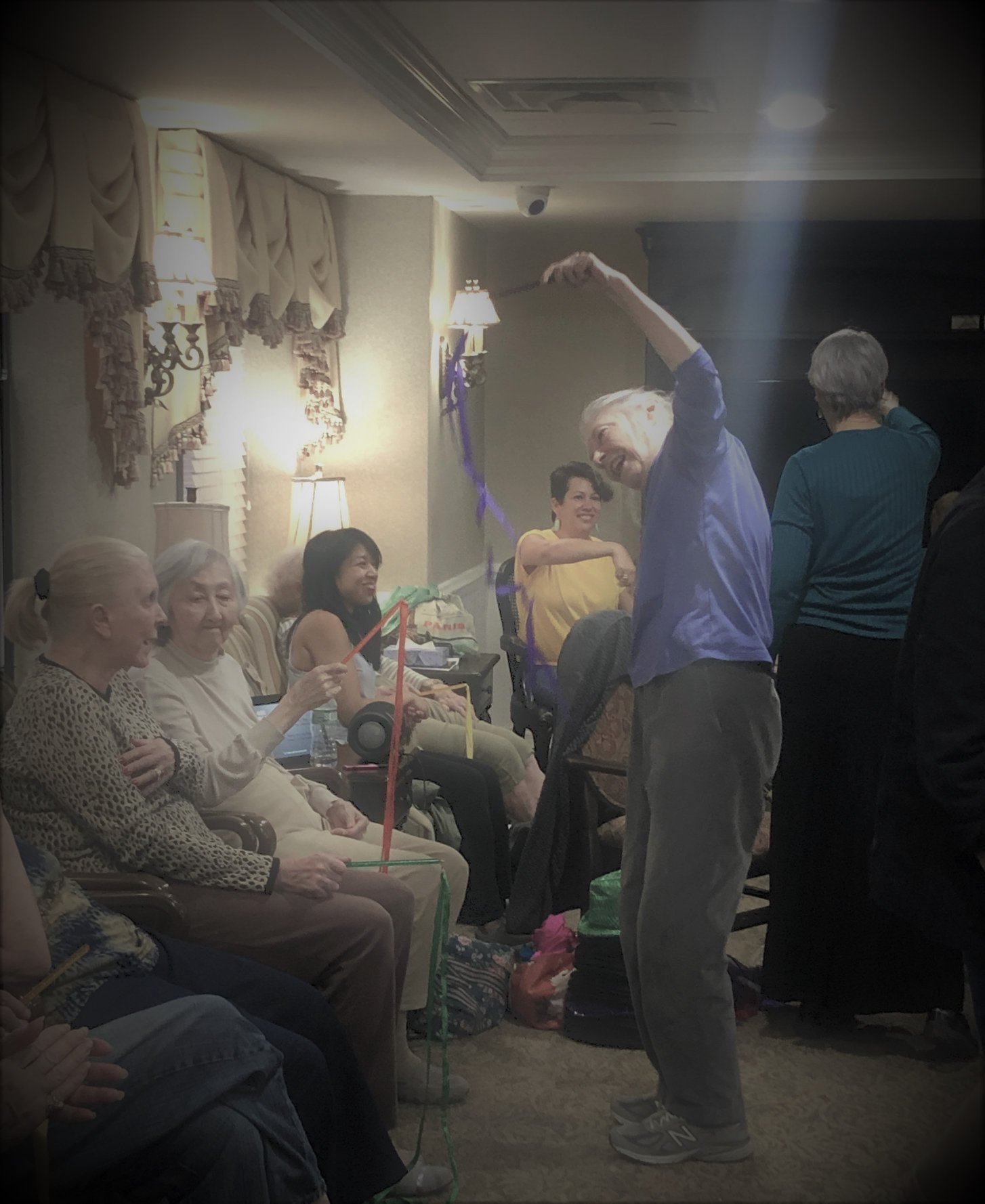Why Dance with People Living with Dementia
Trainees learn to bring dance to people with dementia, including those who need to remain seated.
As a dance/movement therapist for 45 years, my last 20 have focused exclusively on older adults and people with dementia. Why? Because the benefits are so clear and it fills me with joy.
The following is an anecdote about a group I led 15 years ago in an Assisted Living program where most of the residents had moderate dementia.
When I first met F, she came up to me after her evening meal and began talking to me. I asked if we might walk around together some, which she was quite agreeable to do. As we walked, she talked non-stop. She talked at some length and repeatedly about how she tried very hard to do the right thing and to be a good person. She told me that she had been a teacher.
In subsequent weeks, I discovered that F could also be quite irritable. She might be pleasant, as she had been during our first visit, but was often more likely to be cranky, muttering and swearing under her breath. Sometimes her swearing seemed to have nothing to do with what was happening around her; at other times she was expressing her highly critical views of others.
Like this one time, for instance. When I greeted F, offering my hand in a handshake, she was clearly in a bad mood. Her first comment, oozing with sarcasm, in response to my, “Hello. It’s so nice to see you” was “Oh, you think so?” She went on from there with a stream of swear words. “Full of ____!” I told her I would be back shortly, that I wanted to bring her to group, and that we were going to have a good time together. When I came back for her a few minutes later, she was still swearing and muttering. She came with me willingly, and sat in the seat beside me where I indicated.
As she continued swearing, M, the woman beside her, said, “I can’t quite hear her.” I winked at M and told her that it was probably just as well that she couldn’t hear F and said, “You probably wouldn’t like what you hear.” That satisfied M, but also made her curious.
I began the group as I always do with my arms open wide, waiting for them to open their arms as well, as we welcome each other into the group. I play music, and invite them to move, naming each person and the way s/he is moving. I used music early on that was culturally specific to F, remembering that she responded positively to it in prior groups. Not so today. She continued her critical muttering. We all danced with black derby hats, but that didn’t improve her mood one iota. When I handed out ribbon wands, she took one and first put the end in her mouth. She then began to wrap the ribbon around her neck. As she did so, it reminded me of having watched women put their husbands’ ties on their own necks to begin to tie them, and then lifting them over their heads and putting over their husbands’ heads. I asked her if she tied her husband’s tie for him, to which she responded “of course.” She probably tied that ribbon in about 15 knots, with the stick resting against her neck. It couldn’t have been all that comfortable, but she seemed to be happy with the result.
From that point on, F sang and moved with the music, saying what a good time she was having. When group was over, she thanked me repeatedly for the wonderful time. She sat quite still as I untied the 15 knots and she expressed her wish that I come back again soon. I reassured her that I would be back the following week.
I would not have been able to spend 1 hour with F sitting and talking with her alone because the level of relatedness could not have sustained my attention. Nor do I believe that would have improved her mood had I done so. The dance/movement therapy group allowed us an opportunity to be with one another, relating for brief moments, and increasingly with a shared focus of attention, one in which she could also see the increasing engagement of others in the group.
If you are interested in learning how to bring dance to older adults and people with dementia, I will be leading a 15 hour training at Newbridge on the Charles in Dedham, MA. Click here for more details.
